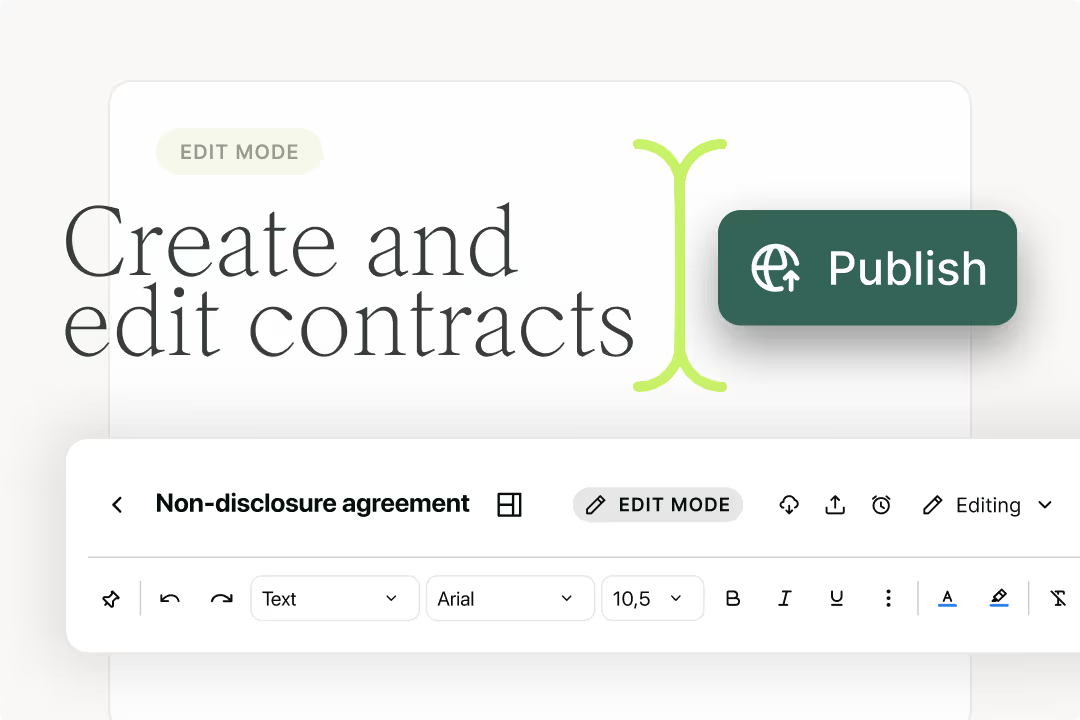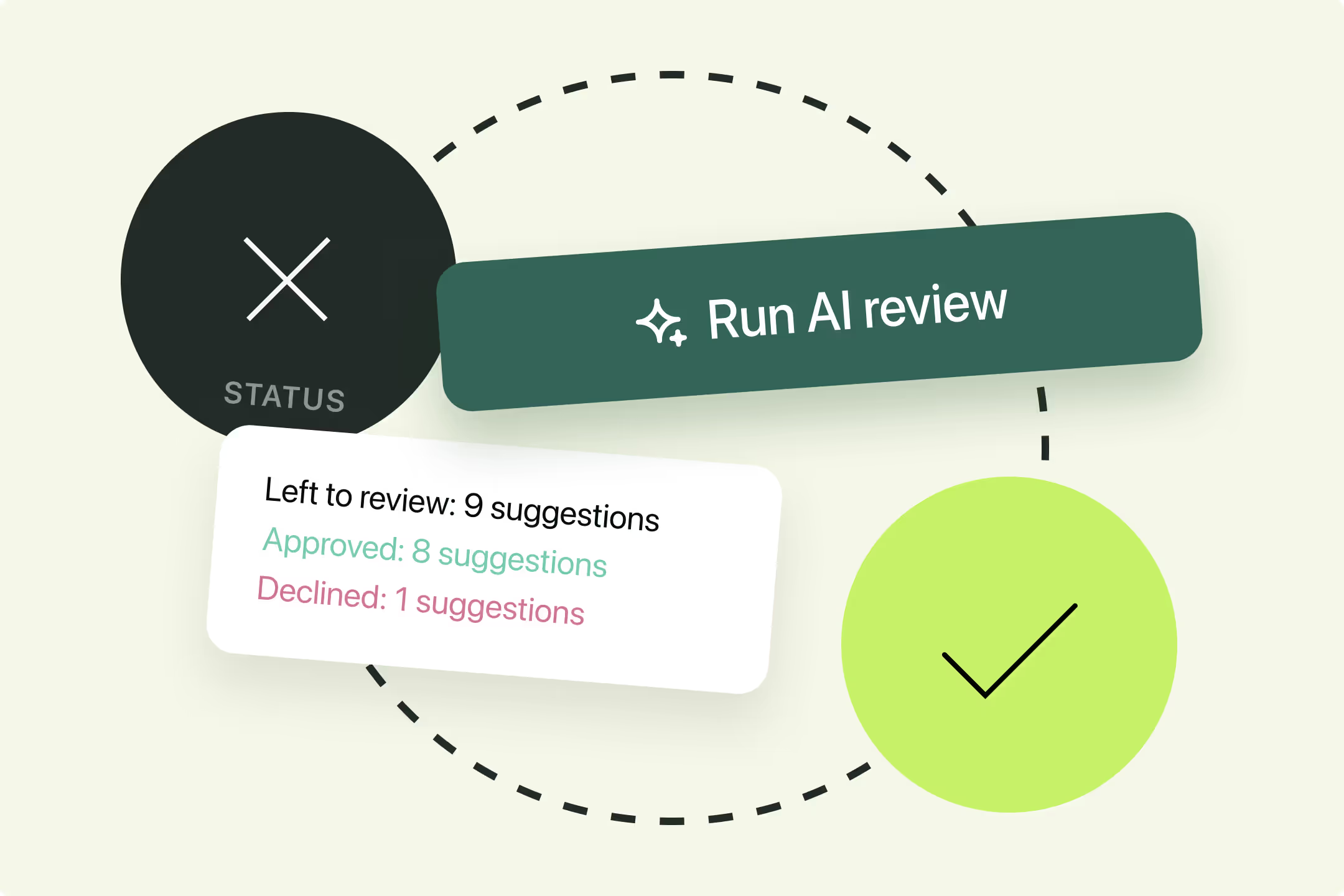Solutions
Customer Support
Resources
Contracts are often a team effort. Yet, most businesses haven't mastered the art of effective contract collaboration, leaving them vulnerable to risk, friction and hidden costs.
In this guide, we'll tell you how you can buck this trend and move towards more collaborative contracting, allowing you to agree contracts faster than ever before.
Contract collaboration refers to a process where different stakeholders work together to create, negotiate and manage contracts.
It describes a situation where different individuals have different responsibilities to fulfil throughout the contract lifecycle. This is common in businesses that manage large contract volumes as legal teams can't own the process from start to finish.

Instead, commercial teams will often be tasked with creating contracts themselves using pre-approved templates. These contract terms are then approved or amended by legal teams during the contract review process. It's also common for senior stakeholders to have the final sign off on a deal, so they'll be involved at a later stage.
When these roles are clearly allocated and completed, the contracting process runs smoothly. When they aren't, the process can become painful and expensive for everyone involved.
When it isn’t clear who is responsible for which stages of a contract lifecycle, you risk costly delays, double work, and contracts getting sent out for signing with terms that would never have been approved.
To minimize these problems, define clearly who is responsible for what, and when people should come into the process. It could be that senior stakeholders only get looped into a contract when it hits a certain contract value threshold, or that legal only reviews contracts that deviate from standard terms.
Codifying this process can reduce confusion and encourage the relevant stakeholders to act quickly, rather than blocking a contract’s progress.
Streamlining communication is key to ensuring everyone is on the same page. When comments, requests, and track changes are spread across several different versions and tools, it’s difficult to track what’s happening and where.
Instead, you should manage your contracts in a collaborative platform like Juro where users can review, redline, and discuss a contract in one unified workspace. This enables stakeholders to make decisions faster, with minimal back and forth.
This is particularly important when negotiating your contracts with counterparties because centralized communication can improve their experience of working with you, providing the foundations for a long-lasting relationship.
{{quote1}}
One way to facilitate better contract collaboration is to automate the processes that cause the most friction between teams.
The contract creation process is a great example. Commercial teams often create their own contracts using contract templates pre-approved by legal. However, legal teams often lose control over the terms that end up in the final version, with other teams amending the terms to suit their requirements, or self-serving using an outdated template.
Introducing automated contract templates allows legal teams to regain control over contractual terms without having to personally draft or oversee each individual contract.

With a contract management solution like Juro, they can control which terms appear in contract templates using conditional logic. They can also lock fields in a contract to restrict editing for non-negotiable terms.
This improves contract collaboration in a few ways:
Juro enables teams to improve legal productivity by enabling other teams to self-serve on contracts. To find out how this would work for your business, hit the button below to speak to a specialist.

It's common for businesses to have a lack of visibility when it comes to contract collaboration. Some requests are shared via email, and others via direct messages. Some edits will be made in new versions of a document, and others as track changes in the original. Before long, you can lose sight of the changes made to a contract and what was agreed.
This makes it difficult to understand why certain decisions were made and whether they were made at all.
To provide more clarity during the contract process, it's a good idea for businesses to keep an audit trail of the changes made to a contract. The best contract audit trails will tell you:
Not only will this give parties a clear understanding of where a contract is in its lifecycle, but it will also provide more certainty in the event of a contractual dispute.
The ability to collaborate on a contract in real time can be a game-changer, particularly when it comes to shortening the time spent negotiating.
When parties take a contract away to work on, the counterparty waits nervously to find out which changes were made. This process is then repeated when the counterparty works on their revised version of the contract, and so on.
This back and forth between separate versions can prolong the contract lifecycle, resulting in costly delays and pressure from within the business to get deals done faster. This wouldn't be the case if businesses could collaborate on a contract in real-time, all from one workspace.

To speed up contract negotiations and reviews, you should use platforms that allow multiple parties to work on the contract simultaneously, fostering a collaborative environment where changes can be made instantly and conversations can happen live in the document.
Contract collaboration software like Juro empowers businesses to do just that, enabling them to agree contracts up to 10x faster than traditional tools and workflows.
Lastly, you should be clear about what effective contract collaboration looks like. This is where setting contract management KPIs can be helpful. It allows stakeholders to understand what you’re working towards collectively and the role they can play in improving the process.
You might want to work with your commercial teams to increase average contract value, for example. Or, you could work with legal teams to shorten how long it takes for a contract to be approved.
Regardless of what you want to achieve through collaborative contracting, make sure you're measuring success against this objective.

Juro's AI-enabled contract automation platform empowers scaling businesses to create, agree, execute and manage contracts up to 10x faster than traditional tools. We are the only platform specifically designed to work for both legal and commercial teams, meaning faster contracting cycles and lower business risk.
Juro also enables teams to collaborate on contracts better, with features that enable teams outside of legal to self-serve on contracts using guardrails set by legal. This means that, unlike other solutions, Juro is built for all kinds of contracts, across all areas of the business.
To find out more, fill in the form below for a personalized demo.
Lorem ipsum dolor sit amet, consectetur adipiscing elit. Suspendisse varius enim in eros elementum tristique. Duis cursus, mi quis viverra ornare, eros dolor interdum nulla, ut commodo diam libero vitae erat. Aenean faucibus nibh et justo cursus id rutrum lorem imperdiet. Nunc ut sem vitae risus tristique posuere.

